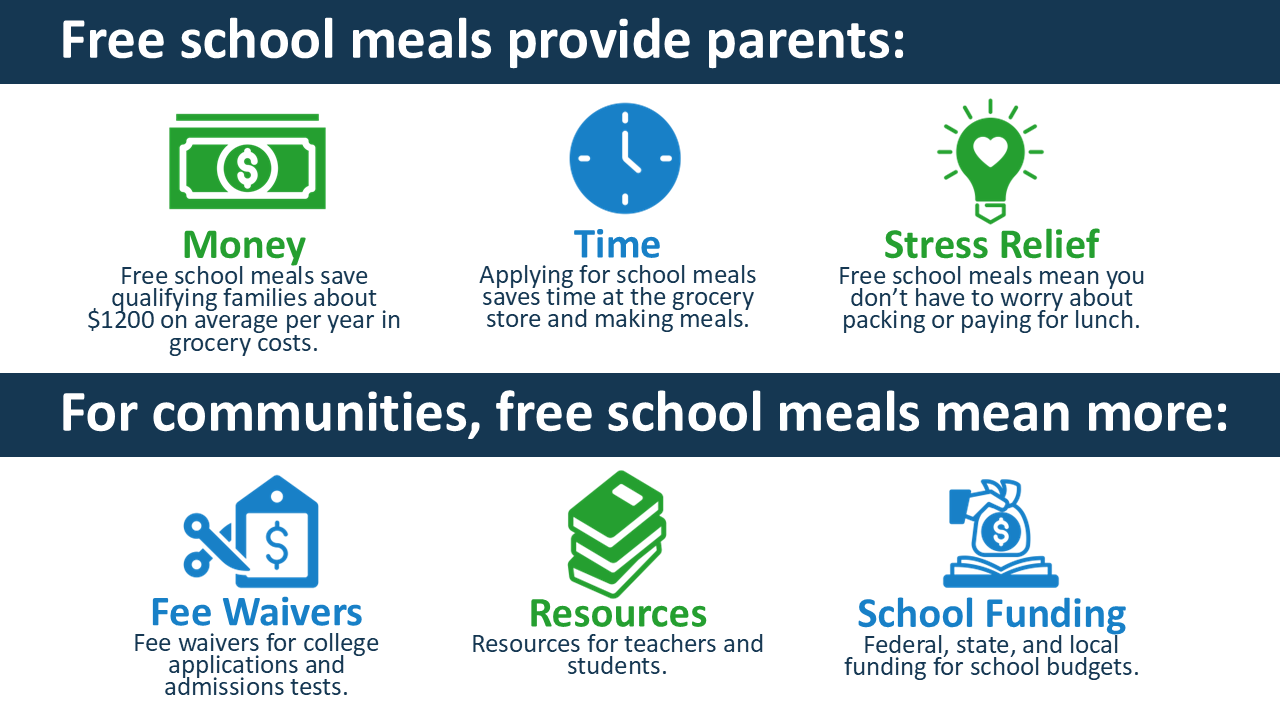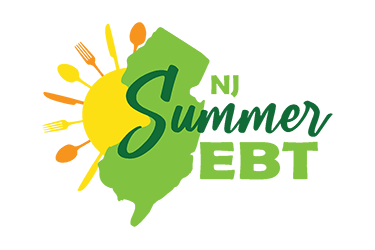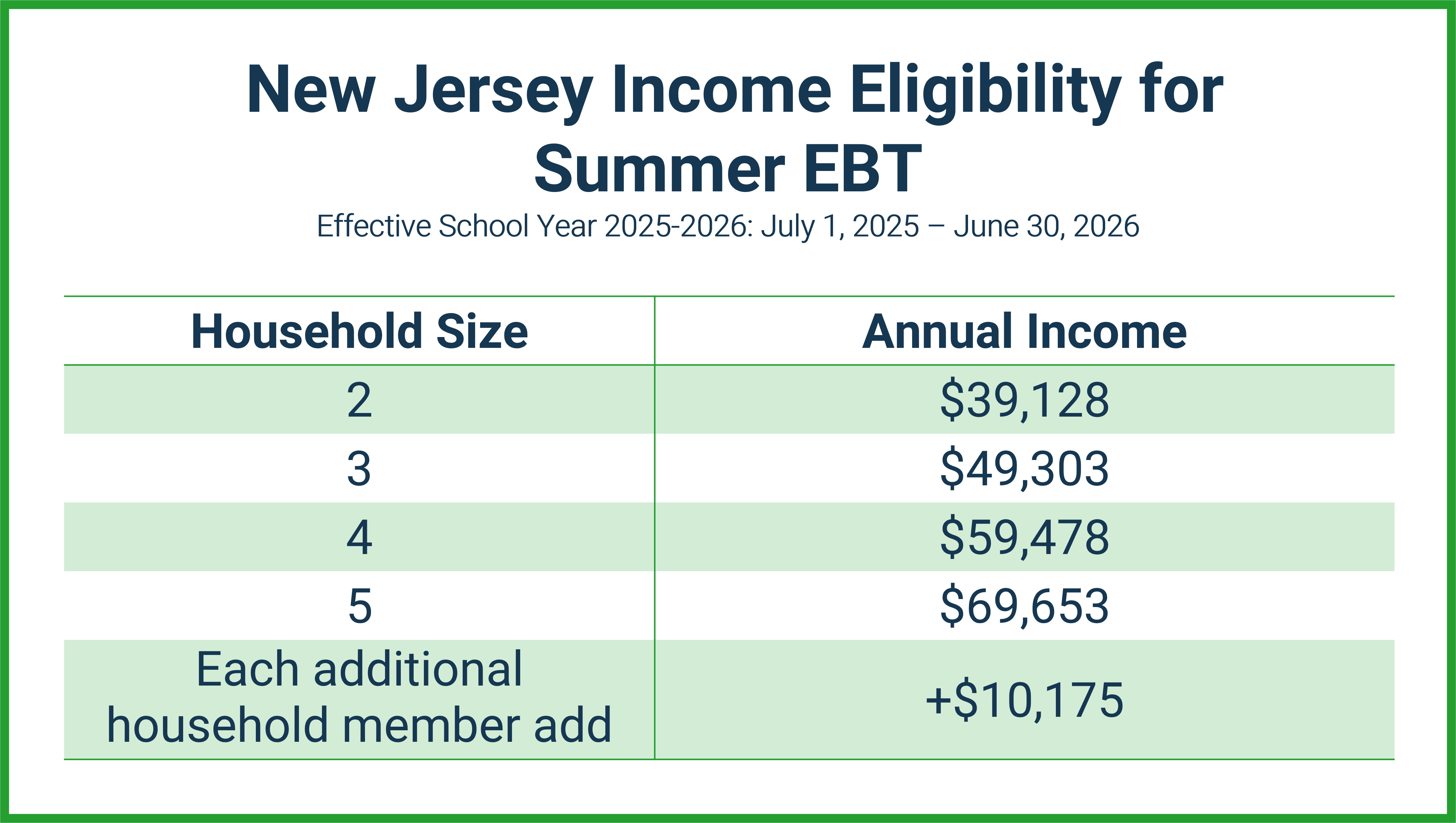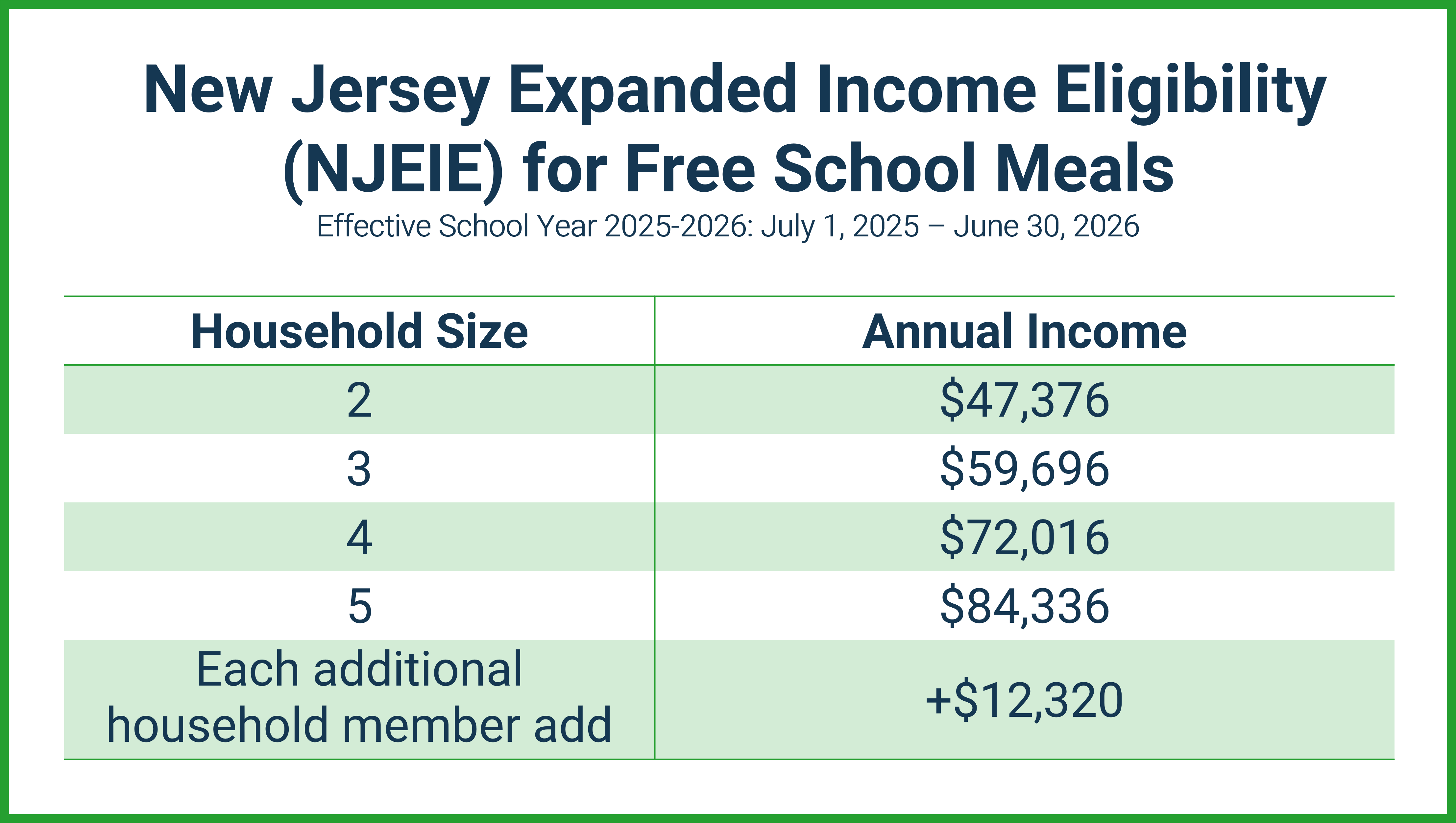Supported Initiatives
2025-2026 School Meals and Summer EBT Application: Information for Families and Resources for Community Organizations

For Families
New Jersey families can save hundreds of dollars this year on school meals. School meals are offered at no cost to families that qualify. Every year, it’s important to complete the “School Meals and Summer EBT Application” and return it to your school, even if you qualified for free meals in the past or your school provides free meals for all.
It’s more than a meal application. The application helps your school know if your student is eligible for free or reduced-price school meals and helps your child’s school receive additional funding! Families that qualify for free school meals can also receive additional benefits such as discounted school fees.

Free school meals provide parents:
1. Money. Free school meals save qualifying families about $1200 on average per year in grocery costs.
2. Time. Applying for school meals saves time at the grocery store and making meals.
3. Stress Relief. Free school meals mean you don’t have to worry about packing or paying for lunch.
For communities, free school meals mean more:
1. Fee Waivers. Fee waivers for college applications and admissions tests.
2. Resources. Resources for teachers and students.
3. School Funding. Federal, state, and local funding for school budgets.
Plus, more New Jersey families have access to free school meals, thanks to legislation that expanded income eligibility guidelines. Your child may qualify for free meals if your household income falls at or below the limits on this chart.
View the full set of income eligibility guidelines here
The school meals application is now combined with the application for Summer EBT, making it simpler and easier for qualifying families to get the free school meals and Summer EBT nutritional benefits that can help nourish their children’s learning and development throughout this school year and next summer break.
Applying for free school meals is fast, easy, and secure. Applications for the 2025-2026 school year are now available. Pick up a paper application copy at your school or visit your school website to learn more.
For more information specifically about Summer EBT nutrition program for children who lose access to free school meals during the summer when school is not in session, visit the NJ Summer EBT website here.
If your child attends a school that opted into the Community Eligibility Provision, your school district will share that information with you. But what does it mean for you as a parent?
- The Community Eligibility Provision is a program that provides free meals to all children attending an enrolled school/district regardless of the household income.
- In Community Eligible Provision schools, the school meals application is used to verify household income which is used to determine how state aid is awarded to the school or district. It is important to complete the application, even if your school has opted into the Community Eligibility Provision.
- The Community Eligibility Provision ensures your child has access to free meals during the school year. However, it does not automatically entitle your student to Summer EBT. If your child is not enrolled in the Supplemental Nutrition Program (SNAP), TANF (Work First NJ) or income-based Medicaid (NJ FamilyCare), you should complete the school meals application to determine Summer EBT eligibility for 2026. Remember, while school meals eligibility is capped at 224% of the Federal Poverty Line (FPL), Summer EBT extends only to 185% of the FPL. For more information, see the Summer EBT information below.
For Community Organizations
Browse these tools to encourage every family in your community to complete a 2025-2026 School Meals and Summer EBT Application as soon as possible:
- The multilingual School Meal and Summer EBT Application outreach toolkit, created in partnership between Hunger Free New Jersey and the NJ Office of the Food Security Advocate. It includes the below tools in nine languages:
- A School Meals and Summer EBT Application explainer and slides
- Social media graphics and sample posts
- Email, newsletter, text message, and phone call templates for schools and organizations to use to communicate with families about the School Meals and Summer EBT Application
- Printable flyers and posters
A recording of the August 20, 2025 School Meals Application Outreach Roundtable call, Bite the Power, Part 2, facilitated by Lisa Pitz of Hunger Free New Jersey and Dr. Dan Dychtwald of the NJ Office of the Food Security Advocate (OFSA). This one-hour roundtable highlighted the 2025-2026 outreach toolkit and local examples of outreach efforts as inspiration for increasing awareness and completion of the school meal application. Viewers will gain a better understanding of who qualifies for free school meals in New Jersey, and why every parent or guardian should complete a School Meals Application every year. There is a particular focus on reaching more New Jersey families, especially those who:
- may be unaware of their newly eligible status thanks to New Jersey’s expanded income eligibility
- might need to only complete an application if their address has changed, thanks to their school enrolling in the Community Eligibility Provision, plus the state’s implementation of Medicaid (NJ FamilyCare) direct certification
By working together, and with Hunger Free New Jersey and OFSA, communities can leverage their connections so more children have access to nourishing and delicious school meals, which can lessen the strain on local charitable food organizations.
Summer Electronic Benefits Transfer (Summer EBT)

Summer EBT is a child nutrition program intended to promote day-to-day food security for children who lose access to free school meals through the National School Lunch Program (NSLP) and School Breakfast Program (SBP) during the summer when school is not in session. Introduced in the summer of 2024, NJ will send an EBT card to every eligible child to purchase food at participating retailers.
For more information, visit the NJ Summer EBT website here.
Eligibility:
If your child is enrolled in the Federal Free and Reduced-Price School Lunch program at a National School Lunch Program-participating school, they will automatically be enrolled in Summer EBT. Your child is eligible to receive a Summer EBT card if your child’s school participates in the National School Lunch Program AND:
- Your child receives free meals at school AND your household income is at or under 185% of the 2025-2026 federal poverty level (see table below); or
- You applied for School Meals/Summer EBT through your school district AND your household income is at or under 185% of the 2025-2026 federal poverty level (see table below); or
- Your household participates in SNAP or TANF (TANF is also known as Work First New Jersey); or
- Your child is experiencing homelessness, a migrant, or in foster care; or
- Your child attends a Head Start program.
If your child’s school does not participate in the National School Lunch Program, your child may still be eligible for Summer EBT if:
- Your household participates in SNAP or TANF (TANF is also known as Work First New Jersey); or
- Your child is experiencing homelessness, a migrant, or in foster care.

View the full set of income eligibility guidelines here.
New Jersey Food Fund

The New Jersey Food Fund was launched in 2024 to strengthen the food security system in New Jersey with a unique approach: bring together private philanthropies and New Jersey state agencies via a partnership with the New Jersey Office of the Food Security Advocate (OFSA) to help nonprofit organizations build capacity and secure more pre-existing public grant opportunities while testing and implementing systems-level food security solutions across the state. Grants from the New Jersey Food Fund support these organizations in the following ways:
1. The Harvest the Future program, which funds projects that test, build, or scale innovations that strengthen food security at its roots. Grantees work on coalition-building, shared systems and infrastructure, and linking locally-grown food to underserved communities.
2. The Grant Navigator program, an in-kind support program that pairs under-resourced nonprofits with experienced grant strategists for one-on-one support. Navigators help grantees identify funding opportunities, craft proposals, build internal metrics and systems, and professionalize fundraising strategies.
Learn more about the Fund, its grantees and partners here.
This first-of-its-kind pooled grantmaking fund in New Jersey is supported by The Tepper Foundation, Novo Nordisk, The Henry & Marilyn Taub Foundation, The Campbell's Foundation, Community Foundation of New Jersey, Grotta Fund for Older Adults, M&T Bank, The O’Toole Family Foundation, Partners for Health Foundation, and Schumann Fund for New Jersey. The Call for Applications is closed.
NJ Food Security Initiative
.jpg)
Led by the Food Research & Action Center (FRAC), with funding from the Robert Wood Johnson Foundation (RWJF), the New Jersey Food Security Initiative (NJFSI) is a three-year cross-sector, collaborative, community-centered effort to increase food security and good nutrition, and advance health equity, in New Jersey. NJFSI aims to increase food security, equitable access to healthier food options, and community purchasing power in New Jersey through enhanced infrastructure, coordination across systems, advocacy, and leveraging of federal, state, and local resources, assets, and opportunities. NJFSI seeks to support and uplift existing initiatives and collaborations across New Jersey by providing additional funding opportunities, capacity-building, resources, and technical assistance.
Visit the NJFSI site to learn more for additional information.
 Official Site of The State of New Jersey
Official Site of The State of New Jersey

